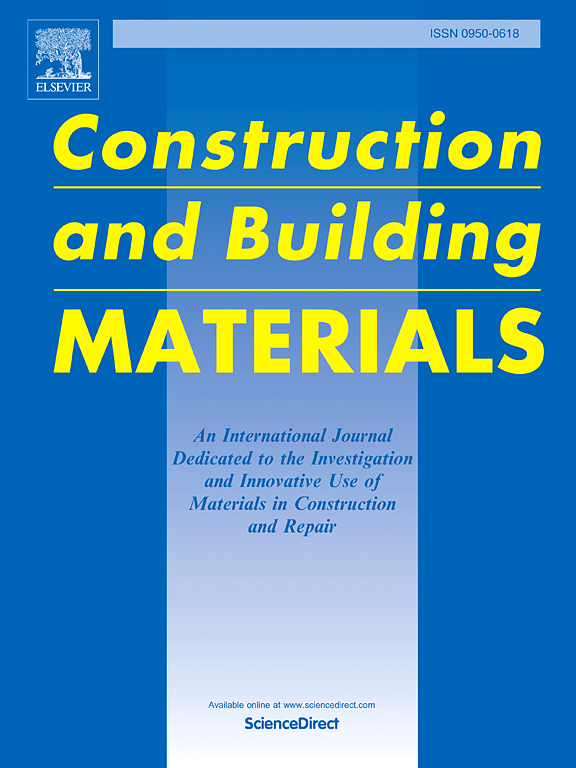Improved mechanical and microscopic properties of ultra-high-performance concrete with the addition of hybrid alkali-resistant glass fibers
IF 7.4
1区 工程技术
Q1 CONSTRUCTION & BUILDING TECHNOLOGY
引用次数: 0
Abstract
Ultra-high-performance fiber-reinforced concrete (UHPFRC), wherein steel fibers are a primary component, is a new cementitious material with high tensile strength and impact resistance. However, steel fibers are susceptible to corrosion in the alkaline environment of concrete matrices. By contrast, alkali-resistant glass fiber (ARGF) exhibits better corrosion resistance. However, few studies have explored the effects of ARGF on UHPFRC, leaving the optimum ARGF content and its enhancement mechanism unclear. Therefore, this study proposes a UHPFRC design that utilizes AR-GF in place of steel fibers. The effects of different types, lengths, and admixtures of AR-GF are investigated using mechanical tests, scanning electron microscopy (SEM), and X-ray diffraction (XRD). The results show that the splitting tensile strength and flexural strength of the UHPFRC increase with fiber length and fiber dosage. The optimum fiber mixing ratio is 30 kg/m3 of 12 mm-long Anti-Crak® 62.4 combined with 0.05 kg/m3 of 6 mm long Anti-Crak® HD, leading to a 23.3 % increase in splitting tensile strength and 15.8 % increase in flexural strength compared to those of undoped concrete. By analyzing the ARGF dispersion pattern at the fracture surface of the flexural test, the ARGF dispersion analysis method was proposed. SEM shows that the ARGF is coated with C-S-H, which increases its adhesion to the concrete matrix. XRD confirms that ARGF does not affect the hydration reaction of the cement in the UHPFRC. Finally, a model of ARGF-reinforced UHPFRC is established to elucidate the reinforcing mechanism. This study provides guidance and a reference for the application of UHPFRC in engineering projects.
添加混合耐碱玻璃纤维,改善超高性能混凝土的机械和微观性能
以钢纤维为主要成分的超高性能纤维增强混凝土(UHPFRC)是一种新型水泥基材料,具有很高的抗拉强度和抗冲击性。然而,钢纤维在混凝土基质的碱性环境中容易受到腐蚀。相比之下,耐碱玻璃纤维(ARGF)具有更好的耐腐蚀性。然而,很少有研究探讨 ARGF 对超高强度混凝土的影响,因此 ARGF 的最佳含量及其增强机制尚不明确。因此,本研究提出了一种利用 ARGF 替代钢纤维的超高压泡沫塑料复合材料设计。研究采用力学测试、扫描电子显微镜(SEM)和 X 射线衍射(XRD)对 AR-GF 的不同类型、长度和掺量的影响进行了研究。结果表明,UHPFRC 的劈裂拉伸强度和弯曲强度随纤维长度和纤维用量的增加而增加。最佳纤维混合比为 30 kg/m3 12 mm 长的 Anti-Crak® 62.4 和 0.05 kg/m3 6 mm 长的 Anti-Crak® HD,与未掺杂的混凝土相比,劈裂抗拉强度提高了 23.3%,抗折强度提高了 15.8%。通过分析抗折试验断裂面的 ARGF 分散模式,提出了 ARGF 分散分析方法。扫描电子显微镜显示 ARGF 涂覆了 C-S-H,这增加了其与混凝土基体的粘附性。XRD 证实 ARGF 不会影响 UHPFRC 中水泥的水化反应。最后,建立了 ARGF 加固 UHPFRC 的模型,阐明了其加固机理。该研究为超高分子量纤维增强混凝土在工程项目中的应用提供了指导和参考。
本文章由计算机程序翻译,如有差异,请以英文原文为准。
求助全文
约1分钟内获得全文
求助全文
来源期刊

Construction and Building Materials
工程技术-材料科学:综合
CiteScore
13.80
自引率
21.60%
发文量
3632
审稿时长
82 days
期刊介绍:
Construction and Building Materials offers an international platform for sharing innovative and original research and development in the realm of construction and building materials, along with their practical applications in new projects and repair practices. The journal publishes a diverse array of pioneering research and application papers, detailing laboratory investigations and, to a limited extent, numerical analyses or reports on full-scale projects. Multi-part papers are discouraged.
Additionally, Construction and Building Materials features comprehensive case studies and insightful review articles that contribute to new insights in the field. Our focus is on papers related to construction materials, excluding those on structural engineering, geotechnics, and unbound highway layers. Covered materials and technologies encompass cement, concrete reinforcement, bricks and mortars, additives, corrosion technology, ceramics, timber, steel, polymers, glass fibers, recycled materials, bamboo, rammed earth, non-conventional building materials, bituminous materials, and applications in railway materials.
 求助内容:
求助内容: 应助结果提醒方式:
应助结果提醒方式:


